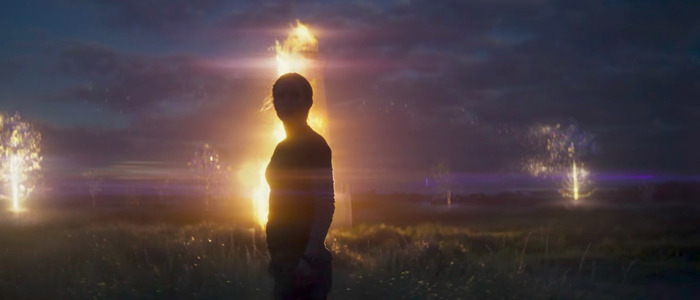'Annihilation' Is A Reminder That Natalie Portman Is One Of The Best Actresses Working Today
Natalie Portman is always proving herself.
It's not a conscious effort, not some desperate act of retribution. There's nothing cloying or even necessarily deliberate about her methods of reinvention, if you can even call it that. She's been a professional actress since she was 11 years old. She's a Harvard graduate, a wife and mother, an Oscar winner. Her career is peppered with both high-caliber performances and less sexy – but certainly more impressive – scientific accolades. She's a woman who's starred in three Star Wars films and penned an academic study called "Frontal lobe activation during object permeance: data from near-infrared spectroscopy."
And yet, she still feels under-appreciated, occasionally disregarded. Her new film, Annihilation, is a reminder that she's one of the finest, and most interesting, actresses working right now.
The Divisive Natalie Portman
Some of that is due to her fiercely self-protective instincts, which might appear more self-righteous than cautiously – and understandably – guarded. Portman supposedly pulled out of her Marvel contract after Patty Jenkins was fired as the director of Thor 2. She doesn't participate in Star Wars fan events like many of her prequel-era co-stars. At age 14, she was slamming director Adrian Lyne for his "sleazy" films, dismissing herself from his Lolita remake to avoid sexual exploitation. (In a recent interview with BuzzFeed, Portman admitted that post-The Professional, "Everything I was being offered was, like, sexy little girls.")
It's disheartening, as a fan, to see how poorly Portman is often regarded. There are rampant claims that she's too much of a "freaky baby," that she "ruined the Thor movies," when her choices and comments are admirable takedowns of the sexist and dangerous Hollywood system she grew up in.
These aren't universal complaints, of course. Portman is still an Academy Award-winning actress, a major star of beloved films, a self-referential rapper ("Say something about the motherf***ing prequels."), and a loud, proud voice in the #TimesUp movement. She recently joined Instagram, a for-the-people PR move that's sure to garner goodwill. And now, perhaps most excitingly, she's the lead of a film that feels like the culmination of everything her career has been building towards: the complicated, transcendent Annihilation.
Annihilation bridges the two versions of Natalie Portman
As a pre-teen, Portman was a member of the World Patrol Kids, a kids band that sang about environmental issues. In addition to her frontal lobe study, she also co-authored a paper about "the enzymatic production of hydrogen from sugar." She has a degree in psychology from Harvard, and studied at the Hebrew University of Jerusalem. Academia and science are as important to her as acting, which is why her role as a biologist in Annihilation feels especially tangible – like she can finally express her extracurricular achievements through a performance, and send a message about female intellectualism and psychology in the process.
"I've never come across some of these questions that [director Alex Garland] poses, and found it really fascinating the way he connected the interior psychological world of these women with their environment," Portman told BuzzFeed about her role as Lena, a former Army officer and current biology professor at Johns Hopkins University. In the opening scenes, we see Lena teaching a class about molecular biology; Portman looks right at home in the part, as if, in another world, this could be her reality. (Portman was a guest lecturer at Columbia University in 2006.)
This isn't the first time Portman has played a scientist onscreen: her Thor character, Jane Foster, was an astrophysicist. "What a great opportunity, in a very big movie that is going to be seen by a lot of people, to have a woman as a scientist," she told the LA Times in 2010 about her decision to take on the stereotype-shattering role. Though Jane was eventually written out of the MCU films, there's no question that Portman's Annihilation character was a chance to evolve that idea, and to include even more women in the discussion this time around.
Annihilation is an Extension of Natalie Portman's Activism
Portman has always been an outspoken advocate, but the #MeToo and #TimesUp movements have positioned her firmly in the awards season spotlight. She's used the opportunity to name-check Dylan Farrow in a televised condemnation of Woody Allen, apologize for signing a petition to grant accused rapist Roman Polanski immunity in the Unite States, and to call-out the whitewashing in her new film. She's also been sure to name-check other women in the movement, like Reese Witherspoon, who are hoping to change Hollywood's systemic sexism and stop its cycle of sexual abuse.
What does this have to do with Annihilation itself? For starters, the film is a firestorm of representation. Fresh on the heels of Black Panther's roaring success and trailblazing black cast, Annihilation is another feast of diversity, with female narratives and perspectives at its core. All of the leads are women, the three supporting male characters are all men of color. The film talks about mental illness, addiction, debilitating grief. One character is openly gay, another terminally ill. The women are mothers and wives, but they are also masters of their chosen fields, and the fact that they're all female is barely highlighted – it simply is.
A film about women working together to overcome insurmountable odds is absolutely the sort of biting, female-focused work that's indicative of #TimesUp. And that's exactly where Portman has focused her vision.
Annihilation further proves Natalie Portman's greatness
In addition to the personally meaningful stuff, Annihilation really solidifies Natalie Portman as a purveyor of eclectic, risky projects. In the last five years, she's starred in two tricky Terrence Malick films (Knight of Cups and Song to Song), played an iconic first lady in Pablo Larraín's magnificently bizarre Jackie (in an underrated, fearsome performance), and directed and starred in the Hebrew-language film A Tale of Love and Darkness, adapted from Amos Oz's autobiographical novel of the same name. Though her entire acting career has been punctuated with bold choices – including her Oscar-winning turn as a tortured ballerina in Darren Aronofsky's Black Swan – her recent efforts further prove she isn't sleepwalking her way through easy Oscar bait, wasting away in franchise hell, or resting on a rom-com safety net.
There's absolutely nothing safe about Annihilation. It's a tour-de-force of hard science fiction, with a third act so poignant, large, and mystifying that it's sure to enrage casual moviegoers. Portman is the center of the storm; the focus of the back-half's immense weirdness. She handles it with knowing aplomb, an actress finally – wholly – in her element.




